Appcar DiagFCA is a Windows software for advanced diagnostics and coding for the most recent Chrysler, Dodge, Jeep and RAM vehicles.
It works with many popular OBD2 devices.
Supported OBD2 devices
USB devices are recommended, but many Bluetooth devices may also work properly.
WiFi interfaces are not supported.
👉 List of recommended USB and Bluetooth devices
⚠️ Caution
There are many interfaces described as ELM327, but not all are compatible with Appcar DiagFCA.
Some of them are 'clones' that do not fully support the ELM327 standard - they are unable to switch diagnostic communication to the other controllers than the engine control module.
Therefore, these devices can work properly with universal software to read data from the engine control module, but will not work with the Appcar software.
Security Gateway Module
Most FCA vehicle starting from the 2018 model year (produced from the summer 2017) have a Security Gateway Module (SGW), working like a firewall.
In these vehicles, for active diagnostics and coding of the settings it is necessary to use an additional SGW Bypass Cable. Read more about SGW bypass.
Access to the CAN bus
As standard, the modules are connected to CAN-C bus, also called CAN-HS (High Speed) to pins 6 and 14 in the OBD2 connector. This network is supported by all recommended OBD2 devices as a standard.
On some vehicles, some modules are connected to CAN-IHS or CAN-CH on non-standard pins.
⚠️ To connect to modules in a CAN-IHS or CAN-CH bus, you need a specific interface or an additional cross adapter.
System Requirements
Supported operating systems:
- Windows XP Service Pack 3 *
- Windows Vista
- Windows 7
- Windows 8, 8.1
- Windows 10
- Windows 11
Both 32-bit and 64-bit operating systems are supported.
* For Windows XP we have prepared a portable version (without the installer), .NET 4.0 Framework is required.
MacOS, iOS, Android and Linux are not yet supported.
USB Devices
USB devices are the most recommended.
Connected between the vehicle's OBD2 diagnostic connector and the laptop's USB port.
✔️ high efficiency and stable connection
✔️ easy to use with Security Gateway Bypass cables
❌ installation of device drivers provided by the manufacturer is required
Vgate vLinker FS USB
Recommendation ⭐⭐⭐⭐
A good device from a Vgate. It supports both CAN buses: CAN-C and CAN-IHS.
It's based on the STN1170 chip.
Device drivers provided by the manufacturer must be installed.
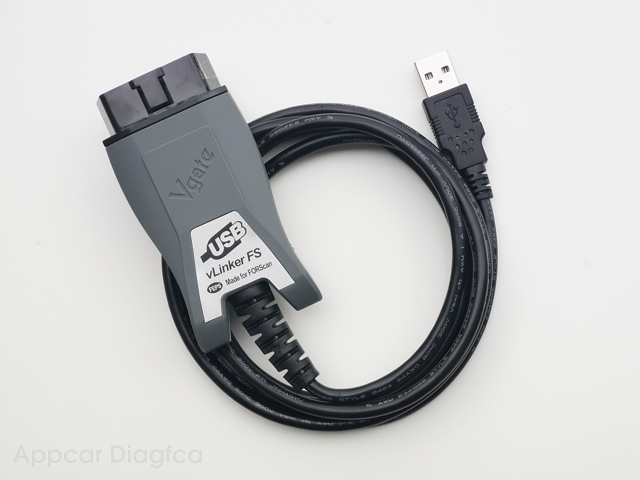
Pros
✔️ supports both CAN-C and CAN-IHS
✔️ speed and stability
✔️ good price
Typical connection settings
Port COM ⇨ USB Serial Port
Baud rate ⇨ 115200
OBDLink EX USB
Recommendation ⭐⭐⭐⭐
A good device from a ScanTool.net. It supports both CAN buses: CAN-C and CAN-IHS.
Appcar v1.6.0.9 and higher supports both CAN-C and CAN-IHS with this device if based in STN2230 chip. STN2231 chip will be supported soon.
It's based on the STN2230 or STN2231 chip.
Device drivers provided by the manufacturer must be installed.
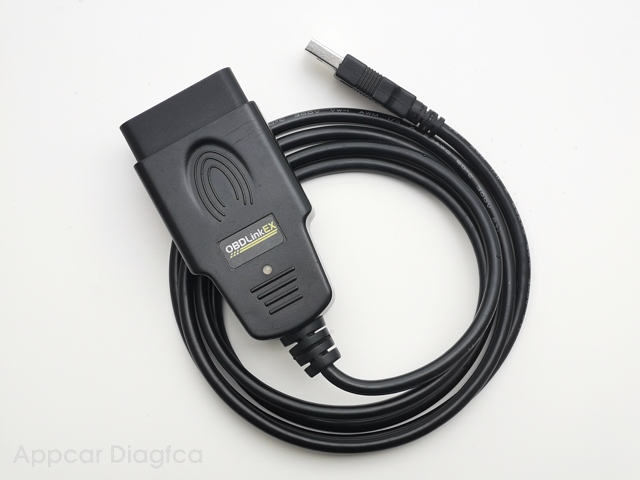
Pros
✔️ supports both CAN-C and CAN-IHS
✔️ speed and stability
Cons
❌ high price
Typical connection settings
Port COM ⇨ USB Serial Port
Baud rate ⇨ 115200
OBDLink SX USB
Recommendation ⭐⭐⭐
A good device from a ScanTool.net. It supports only one CAN bus: CAN-C.
It's based on the STN1130 chip.
Device drivers provided by the manufacturer must be installed.
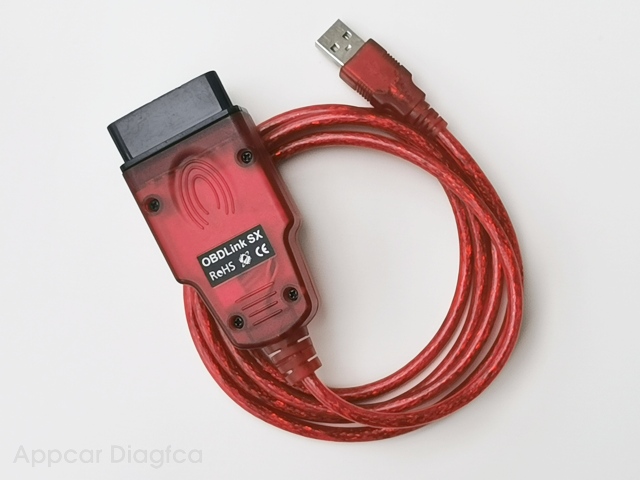
Pros
✔️ speed and stability
Cons
❌ supports only CAN-C bus
❌ high price
Typical connection settings
Port COM ⇨ USB Serial Port
Baud rate ⇨ 115200
ELS27 USB
Recommendation ⭐⭐
A good USB device. It supports both CAN buses: CAN-C and CAN-IHS. There are many replacements made in China with this name.
It's based on the STN1170 chip.
Device drivers provided by the manufacturer must be installed.
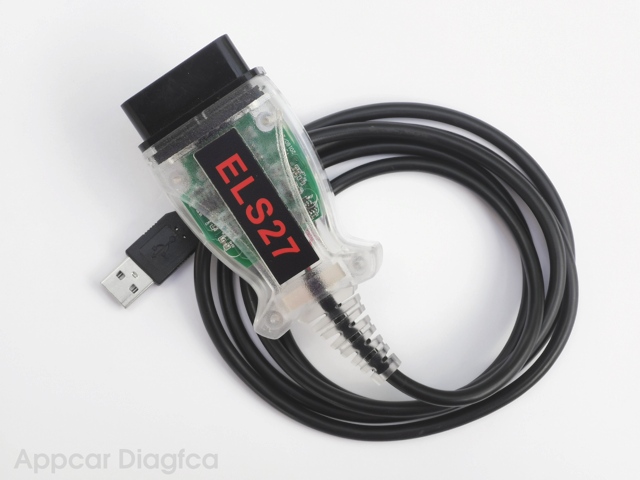
Pros
✔️ supports both CAN-C and CAN-IHS
✔️ speed and stability
✔️ good price
Cons
❌ you can find counterfeit ELS27 devices
Typical connection settings
Port COM ⇨ USB Serial Port
Baud rate ⇨ 38400 or 115200 or 9600
ELM327 USB with CAN-HS/MS switch
Recommendation ⭐
A cheap USB device. It supports both CAN buses: CAN-C and CAN-IHS with hardware CAN-HS/MS switch. There are many replacements made in China with this name.
Device drivers provided by the manufacturer must be installed.
Devices are usually described as for Ford.
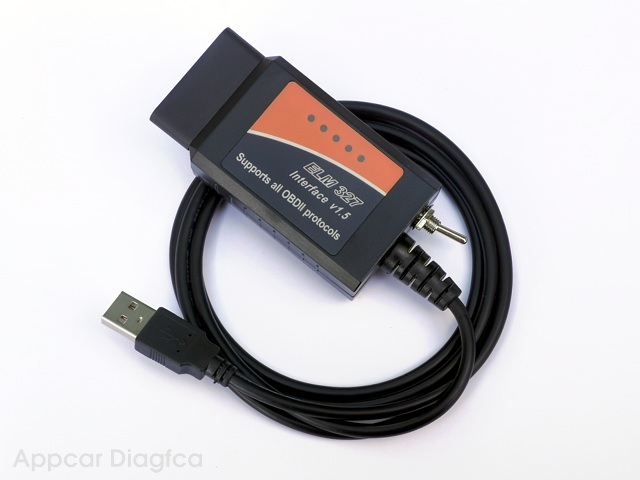
Pros
✔️ supports both CAN-C and CAN-IHS (support for hardware CAN-HS/MS switch was added in Appcar 1.7)
✔️ good price
Cons
❌ you can find counterfeit ELM327 devices
Typical connection settings
Port COM ⇨ USB Serial Port or USB-SERIAL CH340
Baud rate ⇨ 38400 or 115200 or 9600
Bluetooth Devices
USB devices are the most recommended, however, many bluetooth devices are likely to function properly as well.
✔️ no cable connection
❌ there are rarely problems with pairing the device with the Windows laptop
❌ slower data transfer than USB devices
❌ laptop must support bluetooth communication
❌ some devices just need to be searched and paired from the Appcar Settings, others may need to be unpaired and pair first from the Windows bluetooth settings
Vgate iCar2 Bluetooth
Recommendation ⭐⭐
A good device from a Vgare. It supports only one CAN bus: CAN-C on the 6 and 14 pin.
The device is available in various housing colors.
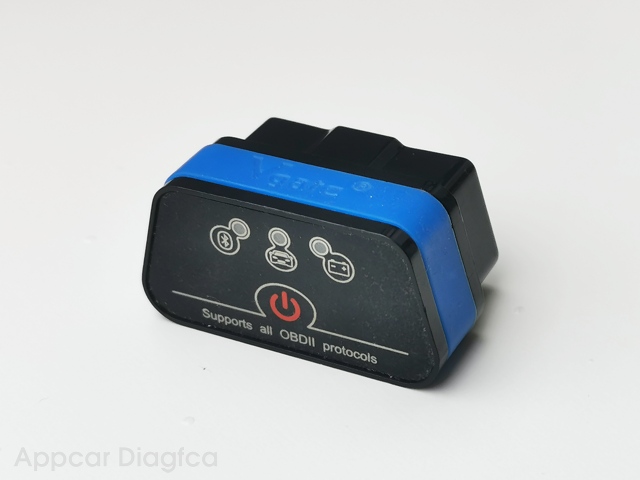
Pros
✔️ good price
Cons
❌ supports only CAN-C bus
Typical connection settings
Connection Method ⇨ Bluetooth direct
Device Name ⇨ VLINK
Carista
Recommendation ⭐⭐
A good device from a Carista. It supports only one CAN bus: CAN-C on the 6 and 14 pin.
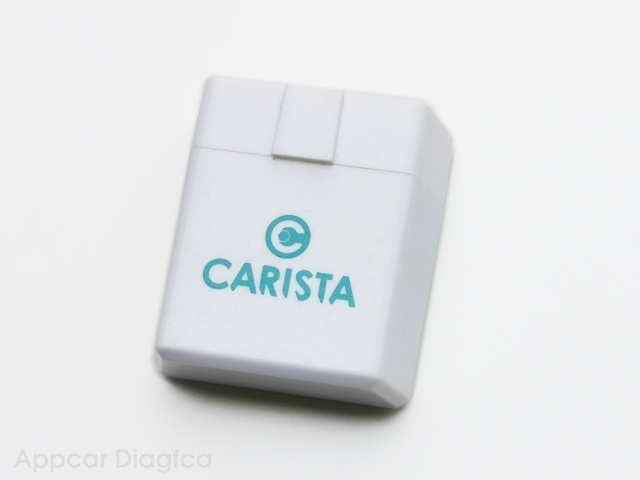
Pros
✔️ good price
Cons
❌ supports only CAN-C bus
Typical connection settings
Connection Method ⇨ Bluetooth direct
Device Name ⇨ Carista
OBDLink MX Bluetooth
Recommendation ⭐⭐
A good device from a ScanTool.net. It supports both CAN buses: CAN-C and CAN-IHS.
Some laptops have problems pairing with this device.
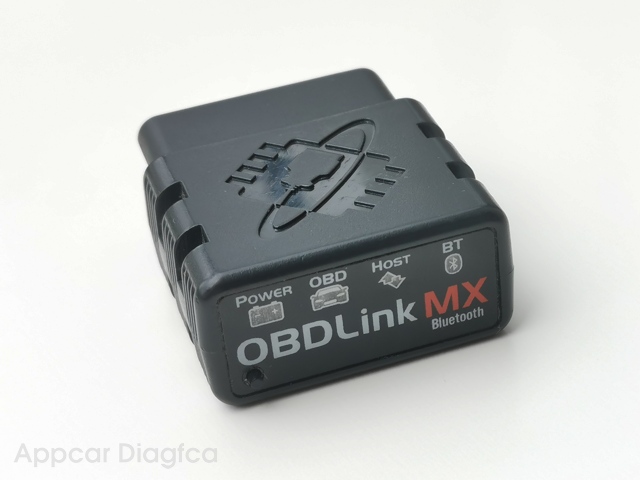
Pros
✔️ supports both CAN-C and CAN-IHS
Cons
❌ sometimes pairing problems occur
❌ high price
Typical connection settings
Connection Method ⇨ Bluetooth direct
Device Name ⇨ OBDLink
OBDLink MX+ Bluetooth
Recommendation ⭐⭐
A good device from a ScanTool.net. It supports both CAN buses: CAN-C and CAN-IHS.
Some laptops have problems pairing with this device.
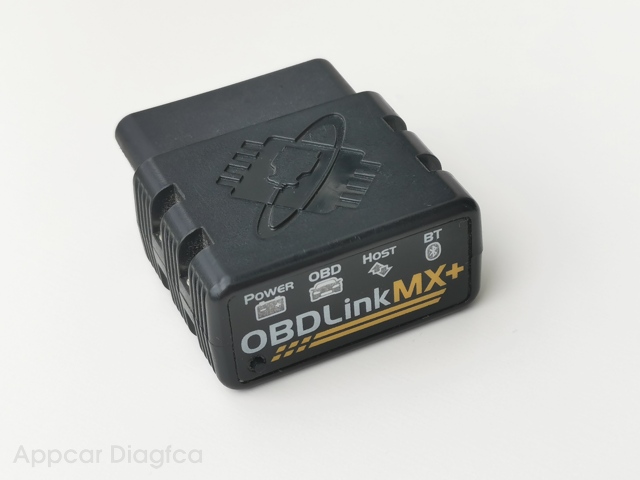
Pros
✔️ supports both CAN-C and CAN-IHS
Cons
❌ sometimes pairing problems occur
❌ high price
Typical connection settings
Connection Method ⇨ Bluetooth direct
Device Name ⇨ OBDLink
Access to the CAN bus
The CAN bus is used to communicate with the modules in the car.
As standard, the modules are connected to CAN-C bus, also called CAN-HS (High Speed) to pins 6 and 14 in the OBD2 connector. This bus is supported by all recommended OBD2 devices as standard.
On some vehicles, some modules are connected to CAN-IHS or CAN-CH on non-standard pins.
To connect to modules in a CAN-IHS or CAN-CH bus, you need a specific interface or an additional cross adapter:
- CAN-IHS (also called CAN-MS - Medium Speed): pins 3 and 11:
- is automatically supported by interfaces based on the STN1170, STN2120, STN2230 or STN2231 chip - see the list of recommended USB or bluetooth devices above,
- alternatively:
- an interface with a hardware CAN-HS / MS switch can be used,
- or "Blue" Cross Adapter / Cable 5,
- CAN-CH pins 12 and 13:
- "Gray" Cross Adapter / Cable 6 is required.
⚠️ Check your vehicle details which CAN buses are used in the OBD2 diagnostic connector.
Blue Cross Adapter / Cable 5
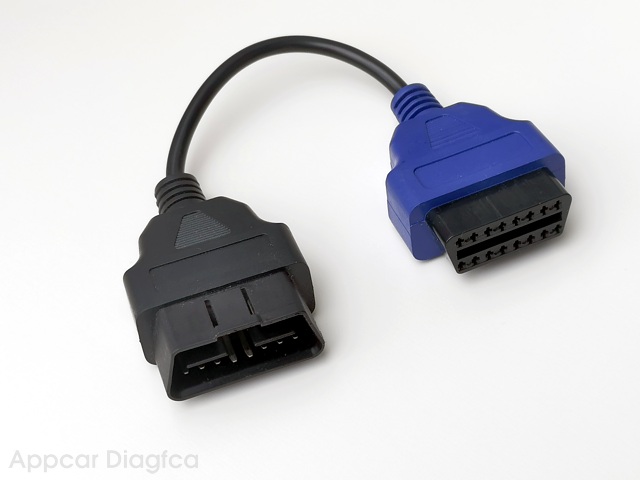
This blue adapter 5 enables connection to a CAN-IHS/MS bus on pins 3 and 11 in the OBD2 connector.
Gray Cross Adapter / Cable 6
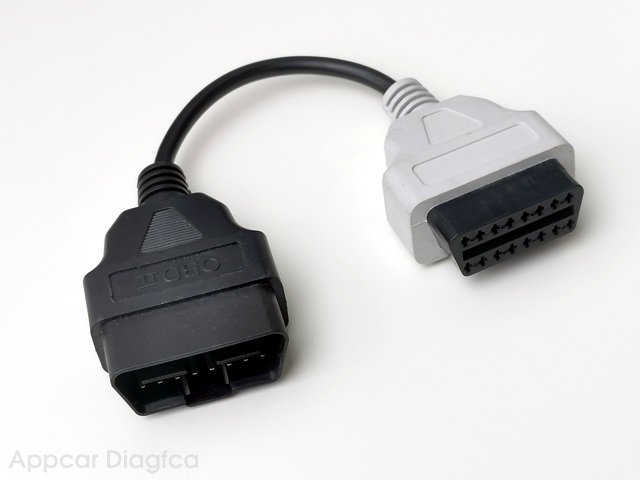
This gray adapter 6 enables connection to a CAN-CH bus on pins 12 and 13 in the OBD2 connector.




